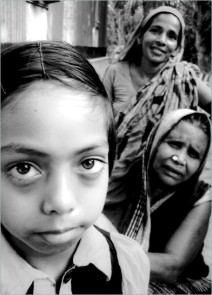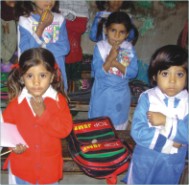| Spotlight
Predators amongst us
Saquifa Binte Seraj
 |
Photo: Nawsabah Noor |
IT was early morning. The alleys of Dhanmondi were packed with cars hurrying to drop children off at schools. Samia* was hastily scurrying down the busy lanes to catch her 8 am class at a nearby university. Suddenly a white Toyota blocked her way at the mouth of a narrow street. The dark, mean-looking, moustached driver craned out his neck through the window and blurted out the word 'sexy'. Samia was caught totally off-guard.
Thousands of girls like Samia are humiliated every single day. It seems like no public or private place is safe for women. Mehruba*, another university student, recalls being sixteen. She and two of her cousins who came from Canada were taken to the crowded market in front of Dhaka College. While shopping, Mehruba realised a vendor of towels and safety pins was crossing them frequently and each time he passed he did not miss to elbow her body. Mehruba became suspicious. She asked her cousins if they were being groped too and the answer was not surprising at all. Six years later when she was shopping at a mega store in Gulshan, someone touched her body. This time instead of silently digesting, she protested and ensured that the man was thrown out of the store.
Asfia* has a more harrowing story to tell, from the age of fourteen to nineteen she was regularly molested by a close family friend. She kept on blaming herself for her predicament and could never summon up the courage to complain to anybody in fear of being wrongly blamed and rejected from the society.
Every girl has a story to tell. A story of being inappropriately touched, groped, ogled, and disgraced. It is time that the wind shifts towards a Bangladesh where women can live their lives without being preys.
*The names are not original but the incidents are real.
Need a Reformation in Education System
Tusar Talukder
 FROM time immemorial, a conventional education system has been running in our country without an iota of change for the positive keeping in view the development pace in other modern countries. Generations after generations have become accustomed to taking this type of traditional education with a lot of patience. FROM time immemorial, a conventional education system has been running in our country without an iota of change for the positive keeping in view the development pace in other modern countries. Generations after generations have become accustomed to taking this type of traditional education with a lot of patience.
However, a small number of intellectuals express their opinions and give suggestions to promote the prevailing system at different times. But to develop the system is not only a demand of intellectuals but that realization is already rooted in the minds of the people. We all want to see the reformed education system in the upcoming years through which our hidden dream would be realised.
Through history, Bangladesh has gone through various phases of education systems. Education has evolved not only in methods but also in fundamental aspects like language and governance. At the very beginning, the system was introduced by the British rulers and it was only available for the upper class.
With the passage of time, education in Bangladesh has evolved in terms of language of instructions and methods. Now, this new era demands something more dynamic. The government should increase the financial allocations for primary schools though poverty is a great threat to primary education. 'Education for all', a prime theme of primary education has to be implemented. Thereupon, a large number of well-trained teachers need to be recruited to provide the best possible education to children. A massive, qualitative change at the secondary level is now a strong demand of the people.
 The government is not tactfully maintaining the colleges under the National University. National University, the biggest public university in Bangladesh, can be further modernized and equipped to deliver but corruption comes in the way. At the tertiary level, we notice a disparity between public and private universities in the perspective of syllabus, curriculum and teachers. Most of the private universities are allegedly dishing out certificates in exchange of money. These universities impart a low standard of education expect for a few. However, these universities have a greater opportunity to uplift their curriculum to an international standard because they take a large amount of money from the students. Some says that there is no need for the existence of English medium alongside the mainstream in Bangladesh. My words for them is that those who have extraordinary talents must approach to take this internationally recognized education but the expenditure of this type of education can be reduced. The government is not tactfully maintaining the colleges under the National University. National University, the biggest public university in Bangladesh, can be further modernized and equipped to deliver but corruption comes in the way. At the tertiary level, we notice a disparity between public and private universities in the perspective of syllabus, curriculum and teachers. Most of the private universities are allegedly dishing out certificates in exchange of money. These universities impart a low standard of education expect for a few. However, these universities have a greater opportunity to uplift their curriculum to an international standard because they take a large amount of money from the students. Some says that there is no need for the existence of English medium alongside the mainstream in Bangladesh. My words for them is that those who have extraordinary talents must approach to take this internationally recognized education but the expenditure of this type of education can be reduced.
A multi-democratic country like Bangladesh is comprised of many political parties and most of the parties have their student wings. As a result student leaders get involved in the national politics. Therefore, nepotism goes on while recruiting students in various jobs. Consequently, a large number of intelligent students are being deprived of having jobs. Therefore, recruitment must be merit based.
The education system is badly in need of reform. The centralized approach that persists stifles innovation. As a developing nation, we have immense possibilities to develop our education sector. But the steps have to be pragmatic, secular and tailored for the twenty-first century.
(Department of English, University of Dhaka)
|

